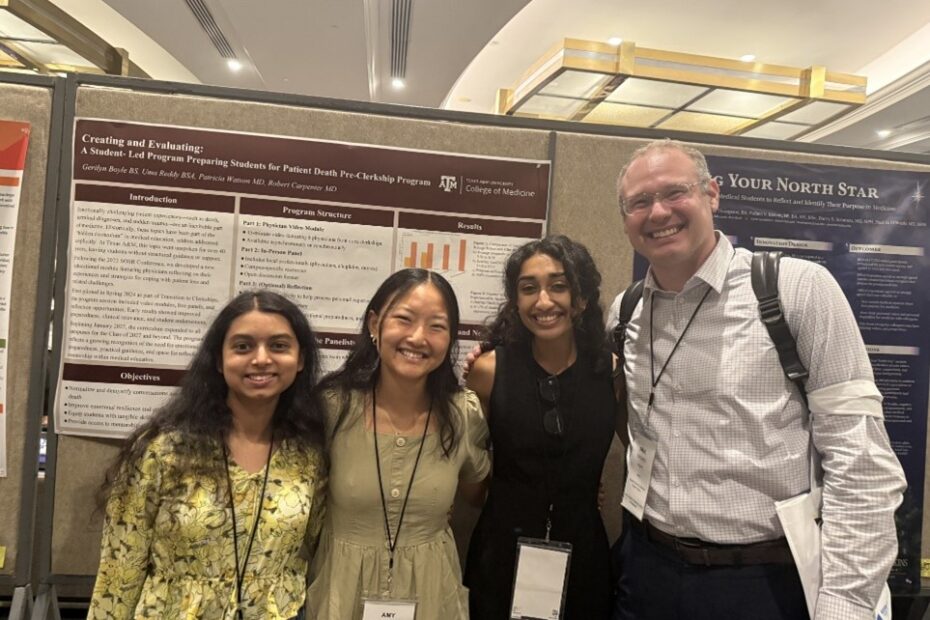Photo left to right: Sahithi Madireddy, Amy Feng, Pallavi Menon, Paul O’Rourke
I was fortunate to receive funding from the school of medicine to attend the 2025 Gold Humanism Summit: The Person in Front of You, held in Baltimore this year. The conference was hosted by the Arnold P. Gold Foundation, an organization dedicated to kind, safe, trustworthy clinical care. So much of the time, it feels impossible to provide this kind of care in health systems that demand high-volume care and in a political climate where medical science is being defunded. It sometimes feels like it is getting harder to be a doctor, and to be a good doctor who is able to do the right thing for their patients.
I headed to the conference during the evenings, when I finished rotating on a busy gastroenterology consult service. While many at the conference were regular attendees, this was also a special opportunity for those of us local to Baltimore to attend. I was pleasantly surprised to see a few classmates there, and I reconnected with them about how their rotations were going. Hopkins medical students at the conference presented work about transformative experiences in museum-based education, identifying in orientation the values that guide you throughout medical school, and creating a children’s book representing a girl with progressive vision loss. It was an incredible mix of art, education, medicine, and health policy.
The conference was like a balm, with many attendees feeling inspired and rejuvenated. The theme of the conference, “The Person in Front of You,” highlighted the human aspects that can be missing behind treatment algorithms, clinical judgment, and medical documentation. It is essential for the clinician to acknowledge the humanity of the patient as the foundation of patient-centered care. It is just as important for clinicians to acknowledge their own humanity, as half of the patient-provider dyad. This was on display with an art gallery present at the conference, with many pieces created by people working in health care. These ranged from self-portraits by physicians and medical students, posed photographs of patients, paintings of flowers, and abstract swirls of color.
What stands out to me is how much art suffused this whole event. Synaptic Clefts, the acapella group of the Johns Hopkins University School of Medicine, joined the Uniformed Services University’s Dermatones to perform a rousing rendition of “Unwritten” by Natasha Bedingfield that got the crowd to their feet. A percussionist and cellist created improvised live accompaniment to participants’ stories during an open mic. Art is more than an auxiliary to medical practice. Art provides an opportunity to connect across shared experiences and capture the nuances of a situation. In this way, art can help build tolerance for ambiguity, which is an essential skill for clinicians practicing in environments that force difficult choices when there are no easy solutions. I’m grateful to have attended the Gold Humanism Summit and to have met people paving the way for humanism in health care. I hope to always remember the impact that I can make one person at a time, and to remember that my work will change me too.
Related Content
- Navigating The Megaconference
- So You Want to Attend an Academic Conference…
- 4 Conference Networking Tips for the Novice
- Four Tips for Preparing for a Conference Presentation
Want to read more from the Johns Hopkins School of Medicine? Subscribe to the Biomedical Odyssey blog and receive new posts directly in your inbox.
